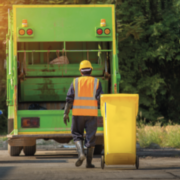Announcing the results of the APSE Refuse Resilience Survey
APSE has released the result of its COVID-19 Refuse Resilience Survey. The Survey finds:
Refuse services are holding up well in spite of the challenges
- 82.8% of respondent authorities saying that they are continuing to collect recycling.
- Just 11.2 % of respondents have moved to residual waste only.
- Whilst 48.5% of garden waste is currently no longer collected, many have proposed to restart collections within the next two weeks of April.
- 66.2% no longer collecting bulky waste with 8.1% reviewing provision as efforts have been concentrated on core collection services of domestic waste and recycling.
In terms of staff health and safety issues:
- 63% of respondent’s have moved to a driver +1 or driver only model of delivery.
- There is some variation on routes dependent on driver and fleet availability and other measures such as plastic screening and additional PPE have been introduced. These measures include minimisation of the time spent in cabs and tip routes without the full crew in the cab; many of introduced collection meeting points on route and keeping, where possible, the same crews together.
- Sickness absence in majority of cases is under 20% even accounting for self-isolation. Where the are shortfalls staff have been seconded from parks, HWRCs or other services to work as loaders.
Household Waste Recycling Centres (HWRCs)
- Just 3.1% of respondents reported HWRCs as open or partially open.
- 80.4% of respondents say all HWRCs are closed and where they are the responsibility of another body, information suggests that the figure of closures overall could be much higher.
- 36% report an increase in fly tipping. 29% report no increase and 21.5% are uncertain due to data lags in many places with some reporting this is mainly due to black bags or supermarket recycling centres.
Key issues before HWRCs could be considered for re-opening include:-
- Clarity from Government on how ‘trips to the tip’ could be consistent with essential journey guidance.
- Maintaining safe distancing at bays.
- Traffic management around sites – a key issue in the initial closures.
- Permit or safe systems to ensure the public do not overwhelm sites once reopened.
- Waste streams that could be accepted dependent upon the reprocessors available.
Fleet availability
- 69.79% of respondents report sufficient additional vehicles if needed to adjust operating models.
- 8% warn fleet availability could be an issue in the coming weeks.
- Near to 20% are permitting staff to use their own vehicles to a collection meeting point.
- Just under 24% of respondents are using fleet / vehicles from other services such as parks.
Workforce health and safety
A key concern for operations managers is safe working conditions both in terms of COVID-19 and reflecting that refuse is already a high-risk industry with stringent health and safety standards. The Survey finds:-
- 100% of respondents report the introduction of social distancing in depots / canteens.
- Near to 70% have revised arrangements for cabs for example reducing the number of workers in the cab.
- 45.5% of introduced ‘double gloving’.
- 17.1% have introduced face masks.
- Over 80% are using deep cleans on vehicles.
- And 95% have Increased sanitisers and hand gels.
- 31.3 % have increased stops for hand-washing / keys for public conveniences.
Landfill and reprocessors
- 93.75% report landfill sites are operating normally.
- 83.3% report that reprocessors are currently operating normally.
- 71.3% have contingency plans in place for recycling.
Commenting on the APSE COVID-19 Refuse Resilience Survey Paul O’Brien, APSE Chief Executive, said, “Undoubtedly refuse and recycling are a highly visible service to the public, made all the more so by the current lockdown. It is a testimony to the operational managers and the frontline staff, who are undoubtedly key workers, that the vast majority of services are still operating effectively. Like the Government, many would now like to see Household Waste Recycling Centres re-open but this must be done in a measured way, and which protects both the staff running these centres and the public using them.”
Ends
- A total of 99 responses were received.
- The Survey data was taken from the responses received between the 8 April and the 15 April.
- APSE will be issuing further refuse resilience surveys to track the data trends and will be comparing results and analysis across similar resilience surveys in parks and open spaces and cemetery and crematoria services.
- APSE works with over 300 UK wide authorities and the Survey includes responses across England, Wales, Scotland and Northern Ireland.
- APSE host APSE performance networks which is the UK’s largest voluntary data benchmarking and alongside specialists data analysts within APSE performance networks also draws upon the frontline services public policy expertise of its membership resources advisors.
For more infromation, please contact Mo Baines on [email protected]


.png)



.png)